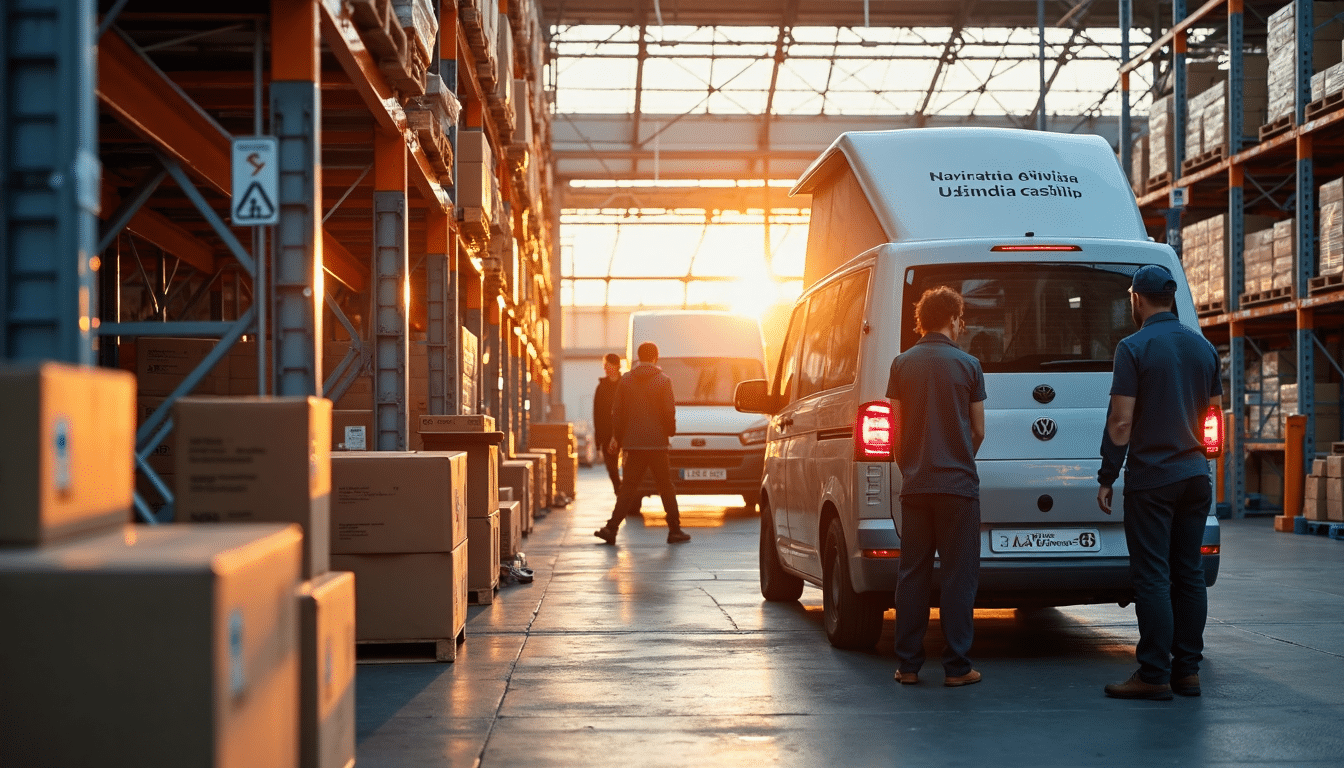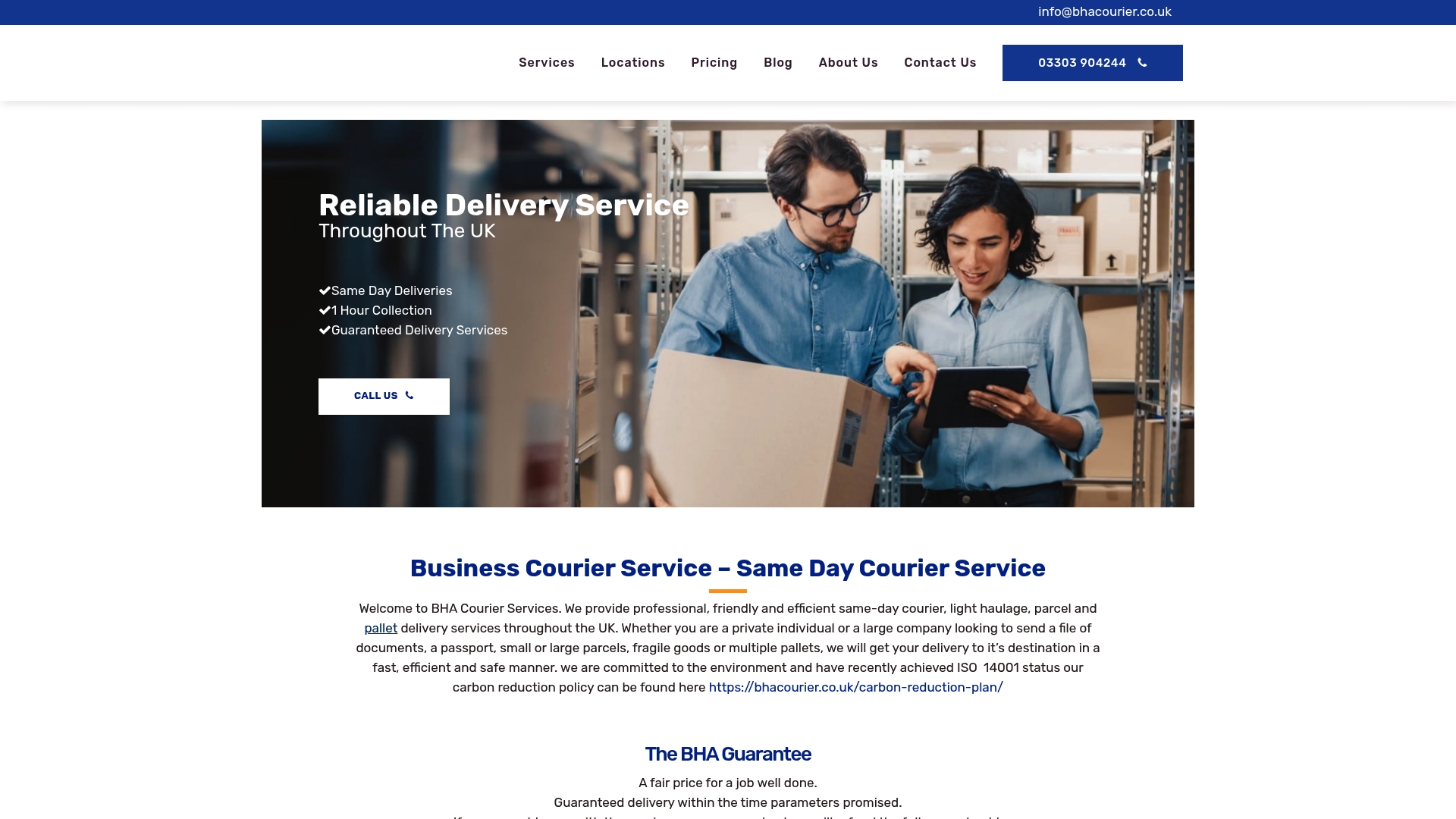
11 Jul New Trends in Logistics 2025: What UK Businesses Must Know

UK logistics is heading for a shakeup as 2025 approaches. A single pilot project has already slashed CO₂ emissions by up to 30 percent and cut transport costs by 37 percent just by adopting smart IoT technologies. Most would assume the biggest hurdles are technical know-how or pricey equipment. The real surprise is that businesses of all sizes can now tap into these advances without breaking the bank. The future of delivery is not just faster, it is cleaner, cleverer, and far more accessible than anyone ever thought possible.
Table of Contents
- How Technology Is Reshaping UK Logistics
- Sustainable And Green Delivery Solutions
- Adapting To Customer Demands In 2025
- Logistics Tips For Small And Medium Businesses
Quick Summary
| Takeaway | Explanation |
|---|---|
| Embrace Advanced Technologies | UK businesses must integrate technologies such as AI, IoT, and quantum computing to enhance logistics efficiency, reduce costs, and improve sustainability. |
| Adopt Sustainable Practices | Companies should implement sustainable delivery solutions like electric vehicles and circular economy principles to meet regulatory demands and consumer preferences for green logistics. |
| Focus on Customer Experience | Businesses must offer hyper-personalised delivery options and leverage technology to enhance customer engagement, responding swiftly to evolving consumer expectations for flexibility and transparency. |
| Develop Supply Chain Resilience | SMEs should diversify their supplier base and explore nearshoring to mitigate risks associated with geopolitical uncertainties and ensure continuity of supply. |
| Collaborate for Cost Efficiency | Small and medium enterprises can benefit from collaborative logistics models, sharing resources and implementing circular economy principles to reduce costs and environmental impact. |
How Technology Is Reshaping UK Logistics
The logistics sector in the United Kingdom is undergoing a profound technological transformation that promises to revolutionise how businesses manage supply chains, transportation, and delivery networks. Advanced digital technologies are not just incrementally improving existing processes but fundamentally reimagining logistics operations across multiple dimensions.

Artificial Intelligence and Machine Learning Driving Efficiency
Artificial intelligence is emerging as a critical driver of logistics innovation. According to the UK government’s AI investment report, £32 million has been invested in AI projects specifically targeting logistics and transportation efficiency. These investments are enabling remarkable advancements in predictive analytics, route optimisation, and demand forecasting.
Machine learning algorithms can now analyse complex datasets in real time, helping businesses predict potential disruptions, optimize delivery routes, and reduce operational costs. Companies can leverage these technologies to make more informed decisions, reducing waste and improving overall supply chain resilience. For instance, AI can help predict maintenance requirements for transportation vehicles, schedule preventative repairs, and minimize unexpected downtime.
Internet of Things and Real Time Tracking
The Internet of Things represents another transformative technology reshaping UK logistics. A pilot programme by Digital Catapult demonstrated that integrating distributed ledger technology and IoT can yield significant benefits. Their research revealed potential reductions of 15-30% in CO₂ emissions, a 37% decrease in transport costs, and a 9% improvement in vehicle fill rates.
Smart sensors and connected devices enable unprecedented visibility into logistics operations. Businesses can now track shipments in real time, monitor environmental conditions during transportation, and ensure optimal handling of sensitive goods. This level of granular tracking not only improves operational efficiency but also enhances customer trust through transparent, data driven logistics management.
Quantum Computing and Future Logistics Optimization
Looking towards 2025 and beyond, quantum computing represents the next frontier in logistics technology. Research from academic publications suggests that quantum computing holds immense potential for solving complex logistical challenges such as routing, scheduling, and network optimization. While current implementation remains limited by hardware constraints, early experiments demonstrate promising capabilities in solving computational problems that traditional computing systems struggle to address.
Quantum algorithms could potentially revolutionize how businesses plan and execute logistics operations, enabling more sophisticated modeling of supply chain dynamics and more efficient resource allocation. By processing multiple potential scenarios simultaneously, quantum computing might unlock unprecedented levels of strategic planning and predictive management.
For businesses in the UK, staying ahead of these technological trends is not just an option but a necessity. Those who proactively integrate these advanced technologies will gain significant competitive advantages, reducing costs, improving sustainability, and delivering superior customer experiences. Learn more about our advanced delivery solutions.
To help readers compare the major technologies discussed, the following table summarises their features and impacts:
| Technology | Key Benefits | Example Application | Status in 2025 |
|---|---|---|---|
| Artificial Intelligence (AI) | Predictive analytics, route optimisation, maintenance planning | Forecasting demand, scheduling repairs | Widely adopted |
| Internet of Things (IoT) | Real-time tracking, emissions reduction, cost savings | Smart sensors for shipment monitoring | Rapidly scaling |
| Quantum Computing | Advanced modelling, resource optimisation, scenario planning | Complex routing & scheduling problems | Emerging, experimental |
Sustainable and Green Delivery Solutions

As environmental concerns continue to escalate, the UK logistics sector is undergoing a critical transformation towards more sustainable and green delivery solutions. Businesses are increasingly recognizing that environmental responsibility is not just a moral imperative but a competitive necessity in the modern marketplace.
Regulatory Drivers and Corporate Sustainability
The UK government is implementing significant legislative frameworks to push businesses towards greener practices. According to the Green Catalyst sustainability report, the Extended Producer Responsibility (EPR) legislation will fundamentally change how companies approach product lifecycle management. This regulation will hold producers directly accountable for the entire lifecycle of their products, creating powerful incentives for designing more recyclable and environmentally friendly logistics solutions.
Companies are responding by developing comprehensive carbon reduction strategies. This includes investing in electric and hybrid delivery vehicles, optimizing route planning to reduce fuel consumption, and implementing sophisticated tracking systems that minimize unnecessary transportation. Our commitment to green logistics extends beyond compliance, focusing on meaningful environmental impact reduction.
Innovative Green Technologies in Delivery
Technological innovations are playing a crucial role in creating more sustainable delivery solutions. Electric vehicles are no longer a futuristic concept but a present reality for forward thinking logistics companies. Major courier services are rapidly electrifying their fleets, with some aiming to achieve zero emission deliveries by 2025.
Advanced routing algorithms now prioritize not just speed and cost, but also environmental impact. These systems can calculate the most fuel efficient routes, combine multiple deliveries to reduce individual vehicle trips, and even factor in the carbon footprint of different transportation modes. The result is a more intelligent approach to logistics that significantly reduces unnecessary environmental strain.
Circular Economy and Reverse Logistics
The concept of a circular economy is revolutionizing how businesses approach product delivery and return processes. Rather than treating packaging and transportation as a linear process, companies are developing systems that prioritize reuse, recycling, and minimal waste. This approach involves creating robust reverse logistics networks that can efficiently handle product returns, repairs, and recycling.
For instance, some innovative companies are now designing packaging that is not just recyclable but actively contributes to environmental restoration. Packaging materials made from biodegradable substances, or those that can be easily repurposed, are becoming standard practice rather than exceptional approaches.
UK businesses must recognize that sustainable delivery is no longer optional. Consumers are increasingly making purchasing decisions based on a company’s environmental credentials. Those who fail to adapt risk losing market share to more environmentally conscious competitors. The future of logistics is green, efficient, and technologically advanced.
By embracing these sustainable practices, businesses can achieve multiple objectives: reducing environmental impact, meeting regulatory requirements, improving brand reputation, and often reducing long term operational costs. The green revolution in logistics is not just coming it is already here.
A summary table below illustrates key sustainable logistics initiatives and their main benefits as noted in this section:
| Initiative | Description | Main Benefit |
|---|---|---|
| Electric / Hybrid Vehicles | Use of non-fossil fuel delivery vehicles | Reduced emissions, regulatory compliance |
| Advanced Routing Algorithms | Route planning optimised for fuel and environment | Lower fuel usage, less environmental impact |
| Recyclable/Biodegradable Packaging | Packaging designed to be reused or compostable | Waste reduction, improved brand image |
| Reverse Logistics Networks | Systematic handling of returns and recycling | Supports circular economy, resource efficiency |
Adapting to Customer Demands in 2025
The logistics landscape in 2025 is being fundamentally reshaped by evolving customer expectations, technological advancements, and increasingly sophisticated consumer preferences. Businesses that fail to understand and quickly respond to these dynamic demands risk becoming obsolete in an increasingly competitive market.
Hyper Personalisation and Flexible Delivery Options
Customer expectations have shifted dramatically from standardised delivery experiences to highly personalised and flexible solutions. According to a consumer behaviour study by McKinsey, 71% of consumers now expect personalised interactions, and this trend is particularly pronounced in logistics and delivery services.
Businesses are responding by developing intricate delivery customisation options. This includes granular time slot selections, real time tracking with precise location updates, and the ability to redirect or modify delivery instructions on the fly. Customers want control and transparency throughout their delivery journey, expecting services that adapt to their specific lifestyle and scheduling needs.
Technology Driven Customer Experience
Digital technologies are revolutionising how businesses interact with customers during the delivery process. Advanced mobile applications and integrated communication platforms enable unprecedented levels of engagement and transparency. Customers now expect instantaneous updates, predictive delivery estimations, and seamless communication channels.
Artificial intelligence is playing a crucial role in enhancing customer experience. Chatbots and automated systems can now handle complex customer queries, provide instantaneous support, and even predict potential delivery issues before they occur. These technologies are not just improving efficiency but are fundamentally transforming customer interaction models in logistics.
Sustainability and Ethical Consumption
Modern consumers are increasingly making purchasing and delivery choices based on a company’s environmental and ethical credentials. A global sustainability report indicates that 66% of consumers are willing to pay a premium for sustainable delivery options.
This trend is driving logistics companies to develop innovative green delivery solutions. From carbon neutral shipping options to packaging made from recycled materials, businesses are recognising that sustainability is no longer optional but a critical competitive differentiator. Consumers want to understand the environmental impact of their deliveries and are actively seeking providers who demonstrate genuine commitment to ecological responsibility.
The future of logistics is not just about moving packages efficiently but creating holistic, personalised, and sustainable delivery experiences. Companies must invest in technologies and strategies that provide transparency, flexibility, and environmental consciousness. Learn more about our customer centric delivery solutions, which are designed to meet these emerging expectations.
UK businesses must recognize that customer demands in 2025 are multifaceted. Success will come to those who can seamlessly blend technological innovation, personalisation, and sustainable practices into their logistics strategies. The delivery experience is no longer a transactional process but a comprehensive journey that reflects a company’s values, capabilities, and commitment to customer satisfaction.
Logistics Tips for Small and Medium Businesses
Small and medium enterprises in the UK are facing increasingly complex logistics challenges that demand strategic thinking, technological adaptation, and innovative approaches to remain competitive in the rapidly evolving marketplace of 2025.
Supply Chain Resilience and Strategic Diversification
According to Barclays Corporate Insights, UK SMEs are recognising the critical importance of supply chain resilience through strategic diversification and nearshoring. The traditional model of relying on a single global supplier is becoming increasingly risky, with geopolitical uncertainties and economic fluctuations posing significant operational challenges.
Businesses should consider developing a multi supplier strategy that reduces dependency on any single source. This approach involves identifying and cultivating relationships with multiple suppliers across different geographical regions, ensuring continuity of supply even during unexpected disruptions. Nearshoring strategies can provide additional benefits, including reduced transportation costs, faster response times, and greater supply chain transparency.
Technology and Cost Effective Solutions
Technology is no longer a luxury but a necessity for small and medium businesses seeking to optimize their logistics operations. Cloud based logistics management platforms now offer affordable solutions that were previously accessible only to large corporations. These technologies enable real time tracking, inventory management, route optimization, and predictive analytics at a fraction of the historical cost.
Small businesses can leverage these technologies to compete with larger enterprises by improving operational efficiency and reducing overhead costs. Explore our light haulage solutions that can help streamline your logistics operations and provide scalable delivery options tailored to your specific business needs.
Sustainability and Collaborative Logistics
Collaborative logistics models are emerging as a powerful strategy for small and medium businesses to reduce costs and environmental impact. By sharing transportation resources, consolidating shipments, and implementing circular economy principles, SMEs can achieve significant operational efficiencies.
Collaboration can take multiple forms: sharing warehouse spaces, participating in joint transportation networks, or developing shared reverse logistics systems. These approaches not only reduce individual business costs but also contribute to broader sustainability goals. Many SMEs are finding that collective logistics strategies can help them compete more effectively against larger, more resourced competitors.
The logistics landscape of 2025 demands adaptability, technological integration, and strategic thinking. Small and medium businesses must view logistics not as a backend operational challenge but as a core strategic capability that can differentiate them in an increasingly competitive market.
Successful SMEs will be those that embrace technological innovation, prioritize supply chain resilience, and remain agile in their approach to logistics management. By investing in smart technologies, developing robust and diversified supply networks, and focusing on sustainability, these businesses can transform logistics from a potential constraint into a significant competitive advantage.
Frequently Asked Questions
What are the main technological trends reshaping logistics in 2025 for UK businesses?
Advanced technologies such as Artificial Intelligence (AI), the Internet of Things (IoT), and quantum computing are driving significant changes in the logistics sector. These innovations enhance efficiency, reduce costs, and improve sustainability across operations.
How can UK businesses implement sustainable delivery solutions?
UK businesses can adopt sustainable practices by investing in electric or hybrid vehicles, utilising advanced routing algorithms, and creating recyclable or biodegradable packaging. Embracing circular economy principles also aids in reducing waste and ensuring compliance with regulatory expectations.
What are the key customer demands in logistics by 2025?
Customers are increasingly seeking hyper-personalised delivery options, transparent tracking systems, and environmentally sustainable practices. Businesses must adapt to these expectations by offering flexible delivery solutions and integrating technology to enhance the customer experience.
What logistics strategies should small and medium enterprises (SMEs) consider in 2025?
SMEs should focus on developing supply chain resilience through strategic diversification and nearshoring. Adopting cost-effective technology solutions and engaging in collaborative logistics can also help streamline operations and improve competitiveness in the market.
Stay Ahead of Logistics Trends with BHA Courier
Are you feeling the pressure to integrate new technology or enhance supply-chain resilience, as outlined in the latest logistics trends for 2025? Many UK businesses worry about keeping up with AI, IoT, or the green delivery demands discussed in our article. Yet the challenge most companies face is finding a logistics partner ready to deliver secure, rapid, and flexible solutions that adapt to emerging expectations for transparency, sustainability, and speed.

Change how your business manages time-sensitive, secure deliveries today. BHA Courier delivers nationwide with same-day and next-day options, transparent online tracking, and full environmental accreditation. You can trust us for urgent or sensitive parcels, light haulage, and specialist document delivery aligned with your future logistics goals. Do not let your competitors outpace you. Discover our swift and secure courier services by visiting BHA Courier and experience a partner that understands the evolving UK logistics landscape.
Recommended
- What Insurance Do Couriers Need? A Comprehensive Guide – BHA Couriers
- Light Haulage Services – UK-Wide Delivery – BHA Couriers
- BHA Couriers West Midlands | Dedicated Delivery
- BHA Couriers East Midlands | Dedicated Delivery
- BHA Couriers BHA Couriers Blog – Same Day Delivery Across The UK
- Business Courier Service – Same Day Courier Service – BHA Couriers
- Truck Hire Trends: What to Expect in the Future
- Winning B2B Marketing Strategies for 2025 Growth


